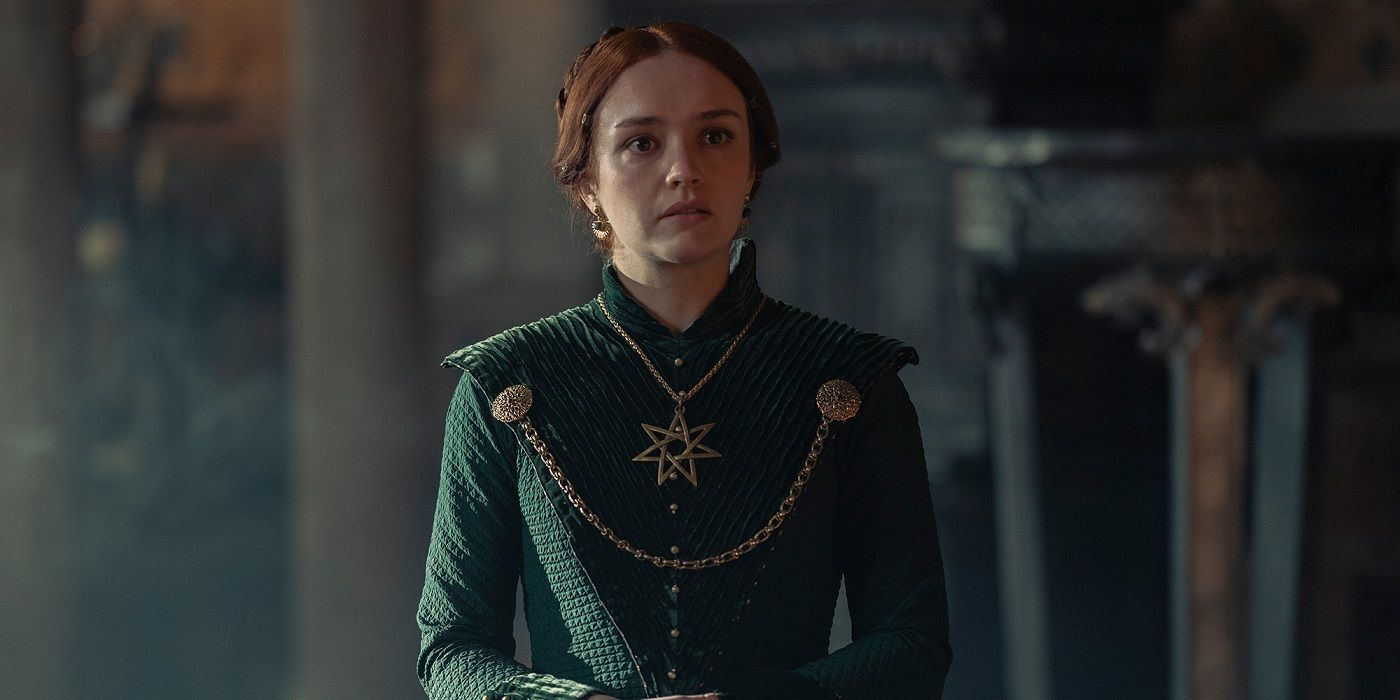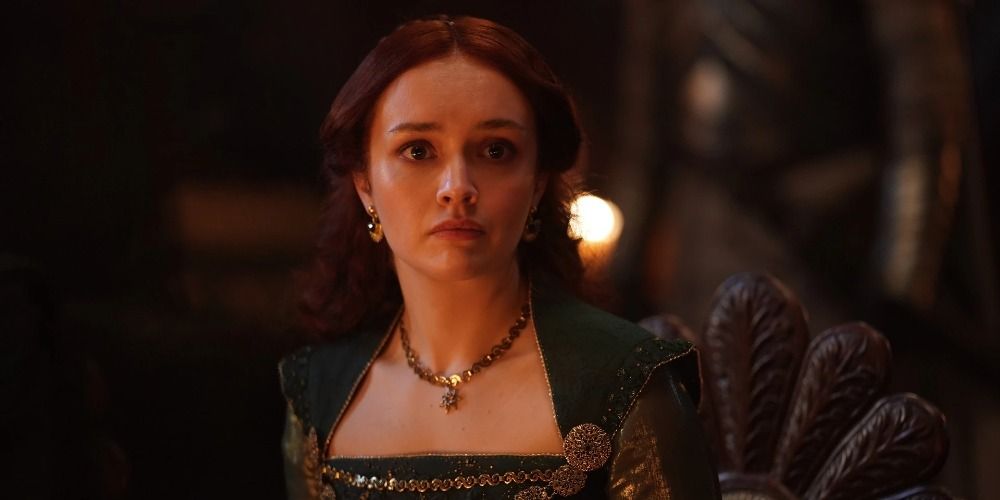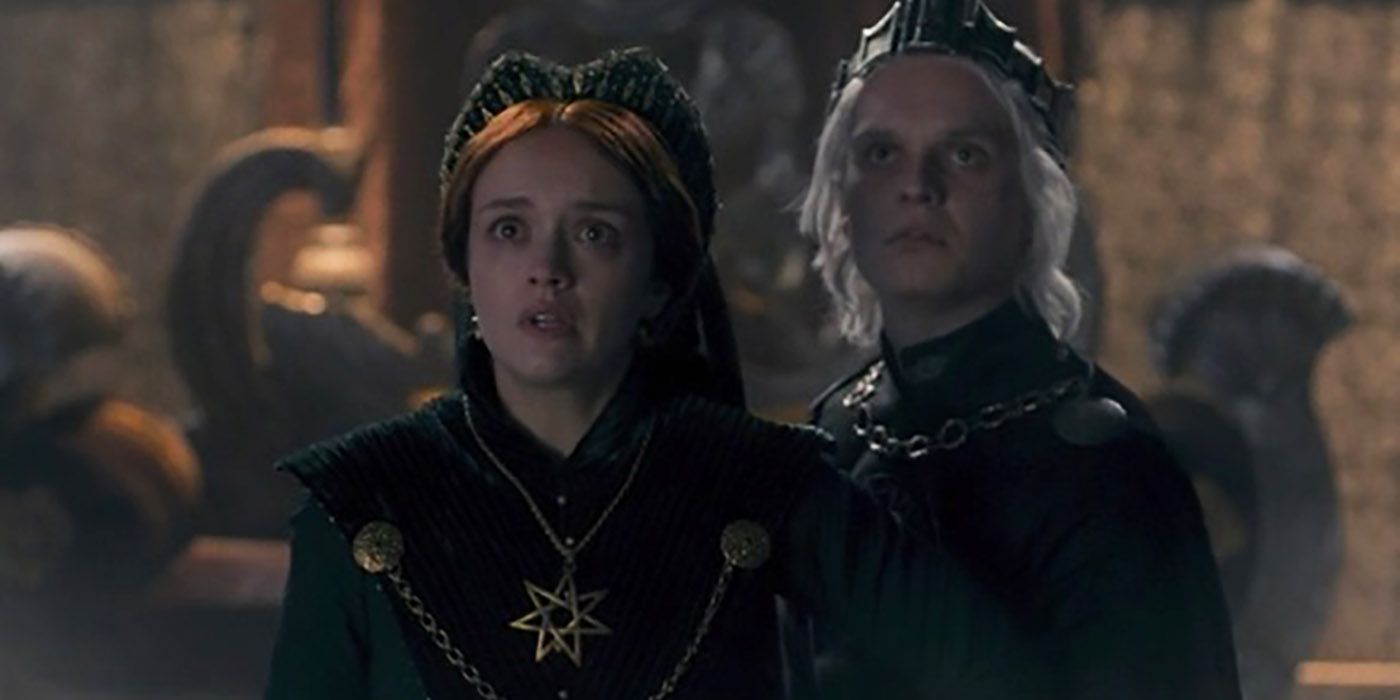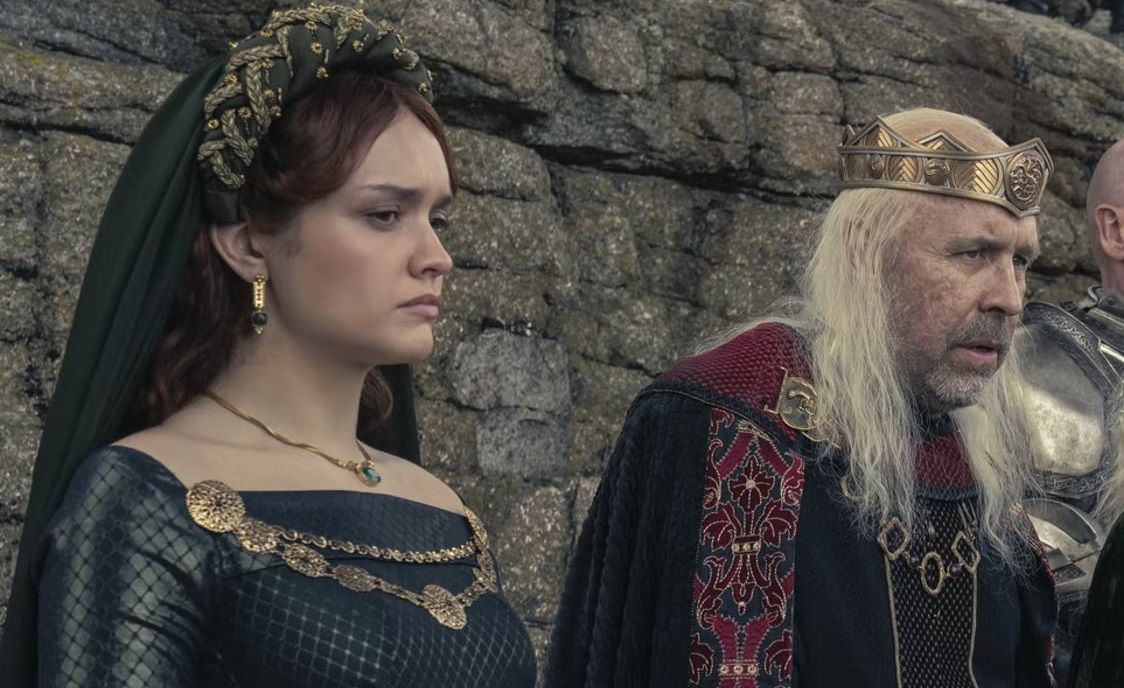Editor's Note: The following contains spoilers for Season 1 of House of the Dragon.
It’s safe to admit that HBO’s Game of Thrones prequel House of the Dragon has gotten off to a stellar start. When the discourse around the series initially began, many were largely cynical — and for good reason. The final seasons of Game of Thrones had culminated in one of the most loathed finales in recent memory and a prequel set almost 200 years before didn’t inspire much confidence. However, there’s since been a change of heart for the viewers who all agree that the debut season is fairly strong. That said, there’s a character that has continued to face fans’ ire and that is Alicent Hightower (Olivia Cooke).
While it is natural for series fans to hate on the villain of their respective shows, what makes this case interesting is that Alicent isn’t really written like a villain. She’s certainly not played like one by Cooke, who injects humanity and empathy in every scene she’s in. And compared to some of the heinous things the others have gotten away with, she’s not even the most morally dubious one out of the lot.
Why Hate on Alicent?
Yet there seems to be some severe apathy if not disdain reserved for Alicent, the origins of which seem beguiling. After all, fans of the series are in love with Daemon (Matt Smith), who goes around casually murdering his first wife Rhea (Rachel Redford), and choking his second one in fits of rage. Usually one could blame this on poor writing or a bad actor helming the role. For instance, maybe Smith is just a better actor than Cooke. But even Alicent’s critics seem to agree that Cooke is every bit deserving of the Best Supporting Actress Emmy she seems destined to be nominated for. And while the dialogue reached the level of the finest Game of Thrones episodes, the series is still very well written, especially considering the character arcs and the fact that the story hasn’t really started yet.
Alicent’s character arc is a great demonstration of that. From an early age, the daughter of Otto Hightower (Rhys Ifans) was someone who carefully abided by all the rules. Despite spending much of her time in the Red Keep and forming a sisterhood with Princess Rhaenyra (Milly Alcock/Emma D’Arcy), Alicent didn’t forget her place and responsibility. The series made it a point to underline the differences between the two, with Rhaenyra being the rule breaker and Alicent always being someone who followed the rules. This was exemplified early in the series when Alicent is shocked at Rhaenyra casually ripping a page out of a book but is also apparent in how closely she follows her father’s commands.
The plan to “entrap” King Viseyrs (Paddy Constantine) was not concocted by her but was another one of her father’s commands that she dutifully followed. Much of the basis of the hate generated against Alicent stems from her having become queen, overlooking the fact that she was a child bride groomed by her father to fulfill his every bid and essentially sold off to consolidate his own place in the Red Keep. The fact that Alicent would be queen was also something he likely thought was in her best interests. But it doesn’t take away from how little attraction Alicent felt towards Viserys, a man old enough to be her father.
Alicent's Doing What She Thinks Is Right
There are also scenes in the HBO series that express the discomfort Alicent felt as she was sexually used by a man older than her. The series also clearly defines the moment her relationship with Rhaenyra becomes irrevocably fraught, and It's when Rhaenyra’s lie about not having spent time out with Daemon results in her father’s expulsion from the Red Keep. This was important because her faith in Alicent cost her family dearly. It’s also vital to stress here that Alicent never particularly wanted power or for her kids to be Kings and is a vocal advocate for Rhaenyra’s bid to be queen, which puts her at odds with her father. Alicent isn’t even aware of the Small Council, which has been meeting behind her back to plan Prince Aegon (Tom Glynn-Carney)’s ascension, and although she ultimately chooses to support the Small Council in their effort, it isn’t out of greed or the betterment of her family but because she thinks (however, misguidedly) that it is what the late king wished for.
In Episode 7, a pivotal scene puts the children of Rhaenyra against Alicent’s, leading to a psychological breaking point where Alicent seems to be done with how little consequence Rhaenyra seems to face for her actions, something that now seems to extend to her children as well. Adding insult to injury for the more conservative Alicent is how unabashed Rhaenyra is in her affair with Harwin Strong (Ryan Corr) and how all of Rhaenyra’s children up at that point are bastards — something that Viserys seems to be turning a blind eye to.
After she aims to stab Lucerys (Elliot Grihault) for blinding Aemond (Ewan Mitchell), she is stopped by Rhaenyra and Rhaenyra remarks that it must be exhausting hiding under her own cloak of righteousness. It's a very aptly put statement that nails down Alicent’s nuanced character. Because Alicent has quietly suffered at first being a child bride and then child mother, and done so without complaint, in her worldview it doesn’t make sense for others who haven’t toiled away to come out winners.
Alicent Is a Woman of Tradition
Alicent is a woman of custom and tradition who constantly wants to do the right thing, even as the series proves time and time again that her naïveté makes her an easy puppet to be manipulated, whether by Rhaenyra or her own father, and leads her to strange bedfellows from Criston Cole (Fabian Frankel) to Larys Strong (Matthew Needham). Alicent’s actions and how they inadvertently hurt Rhaenyra aren’t to be justified, but it is quite fascinating how one-sided the conversations are about the House of the Dragon with the fans in love with House Black and very dismissive if not antagonistic towards House Green.
While these arbitrary divisions make sense — even its predecessor thrived on people pitting future Throne contenders against one another on the interwebs. The "'good vs. bad" narrative regarding the Blacks vs. Greens fight at this point seems quite simplistic since all the characters, and particularly the villain the internet wants, Alicent, is fairly nuanced and doesn’t deserve to be dismissed. It is somewhat alarming that people are ready to endorse an uncle grooming his niece and calling it romantic and are further dogpiling on a character practically sold by her father into becoming a child bride and forced to fulfill her sole duty of creating heirs even before she is of age. There’s ample evidence in the series that permits Alicent to be every bit as self-righteous as she is shown, and the series overall does a fairly decent job of showing us how harrowing her journey has been.
Where the series falters is in not having made three-dimensional characters out of Team Green, where everyone other than Alicent is defined by their incel energy. Going forth, the writers would be wise to perhaps explain what drives characters like Otto and why Ser Criston is still hell-bent on hurting Rhaenyra. With Rhaenyra ready to strike back at Team Green following the death of her son, the writers have a clear way to humanize characters in Team Black. As for Alicent, hopefully, the series continues to write her as strongly as they have in the freshman run, and hopefully, the strength of the character wins her some fans as the war in Westeros officially begins come Season 2.




